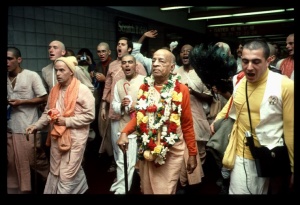CC Madhya 15.120 (1975): Difference between revisions
(Vanibot #0027: CCMirror - Mirror CC's 1996 edition to form a basis for 1975) |
(Vanibot #0020: VersionCompareLinker - added a link to the Version Compare feature) |
||
| Line 2: | Line 2: | ||
<div style="float:left">'''[[Sri Caitanya-caritamrta (1975)|Śrī Caitanya-caritāmṛta (1975)]] - [[CC Madhya (1975)|Madhya-līlā]] - [[CC Madhya 15 (1975)|Chapter 15: The Lord Accepts Prasādam at the House of Sārvabhauma Bhaṭṭācārya]]'''</div> | <div style="float:left">'''[[Sri Caitanya-caritamrta (1975)|Śrī Caitanya-caritāmṛta (1975)]] - [[CC Madhya (1975)|Madhya-līlā]] - [[CC Madhya 15 (1975)|Chapter 15: The Lord Accepts Prasādam at the House of Sārvabhauma Bhaṭṭācārya]]'''</div> | ||
<div style="float:right">[[File:Go-previous.png|link=CC Madhya 15.119 (1975)|Madhya-līlā 15.119]] '''[[CC Madhya 15.119 (1975)|Madhya-līlā 15.119]] - [[CC Madhya 15.121 (1975)|Madhya-līlā 15.121]]''' [[File:Go-next.png|link=CC Madhya 15.121 (1975)|Madhya-līlā 15.121]]</div> | <div style="float:right">[[File:Go-previous.png|link=CC Madhya 15.119 (1975)|Madhya-līlā 15.119]] '''[[CC Madhya 15.119 (1975)|Madhya-līlā 15.119]] - [[CC Madhya 15.121 (1975)|Madhya-līlā 15.121]]''' [[File:Go-next.png|link=CC Madhya 15.121 (1975)|Madhya-līlā 15.121]]</div> | ||
{{CompareVersions|CC|Madhya 15.120|CC 1975|CC 1996}} | |||
{{RandomImage}} | {{RandomImage}} | ||
==== TEXT 120 ==== | ==== TEXT 120 ==== | ||
| Line 25: | Line 24: | ||
<div class="translation"> | <div class="translation"> | ||
"Mukunda dāsa externally appears to be a royal physician engaged in governmental service, but internally he has a deep love for Kṛṣṇa. Who can understand his love? | |||
</div> | </div> | ||
| Line 32: | Line 31: | ||
<div class="purport"> | <div class="purport"> | ||
Unless Śrī Kṛṣṇa Caitanya Mahāprabhu discloses the fact, no one can understand who is actually a great devotee of the Lord engaged in His service. It is therefore said in | Unless Śrī Kṛṣṇa Caitanya Mahāprabhu discloses the fact, no one can understand who is actually a great devotee of the Lord engaged in His service. It is therefore said in Caitanya-caritāmṛta ([[CC Madhya 23.39]]), tāṅra vākya, kriyā, mudrā vijñeha nā bujhaya: even the most perfect and learned scholar cannot understand a Vaiṣṇava's activities. A Vaiṣṇava may be engaged in governmental service or in a professional business so that externally one cannot understand his position. Internally, however, he may be a nitya-siddha Vaiṣṇava-that is, an eternally liberated Vaiṣṇava. Externally Mukunda dāsa was a royal physician, but internally he was the most liberated paramahaṁsa devotee. Śrī Caitanya Mahāprabhu knew this very well, but ordinary men could not understand it, for the activities and plans of a Vaiṣṇava cannot be understood by ordinary men. However, Śrī Caitanya Mahāprabhu and His representative understand everything about a devotee, even though the devotee may externally pretend to be an ordinary householder and professional businessman. | ||
</div> | </div> | ||
Latest revision as of 08:48, 27 January 2020

A.C. Bhaktivedanta Swami Prabhupada
TEXT 120
- bāhye rāja-vaidya iṅho kare rāja-sevā
- antare kṛṣṇa-prema iṅhāra jānibeka kebā
SYNONYMS
bāhye—externally; rāja-vaidya—royal physician; iṅho—he; kare—performs; rāja-sevā—government service; antare—within the heart; kṛṣṇa-prema—love of Kṛṣṇa; iṅhāra—of Mukunda dāsa; jānibeka—can know; kebā—who.
TRANSLATION
"Mukunda dāsa externally appears to be a royal physician engaged in governmental service, but internally he has a deep love for Kṛṣṇa. Who can understand his love?
PURPORT
Unless Śrī Kṛṣṇa Caitanya Mahāprabhu discloses the fact, no one can understand who is actually a great devotee of the Lord engaged in His service. It is therefore said in Caitanya-caritāmṛta (CC Madhya 23.39), tāṅra vākya, kriyā, mudrā vijñeha nā bujhaya: even the most perfect and learned scholar cannot understand a Vaiṣṇava's activities. A Vaiṣṇava may be engaged in governmental service or in a professional business so that externally one cannot understand his position. Internally, however, he may be a nitya-siddha Vaiṣṇava-that is, an eternally liberated Vaiṣṇava. Externally Mukunda dāsa was a royal physician, but internally he was the most liberated paramahaṁsa devotee. Śrī Caitanya Mahāprabhu knew this very well, but ordinary men could not understand it, for the activities and plans of a Vaiṣṇava cannot be understood by ordinary men. However, Śrī Caitanya Mahāprabhu and His representative understand everything about a devotee, even though the devotee may externally pretend to be an ordinary householder and professional businessman.